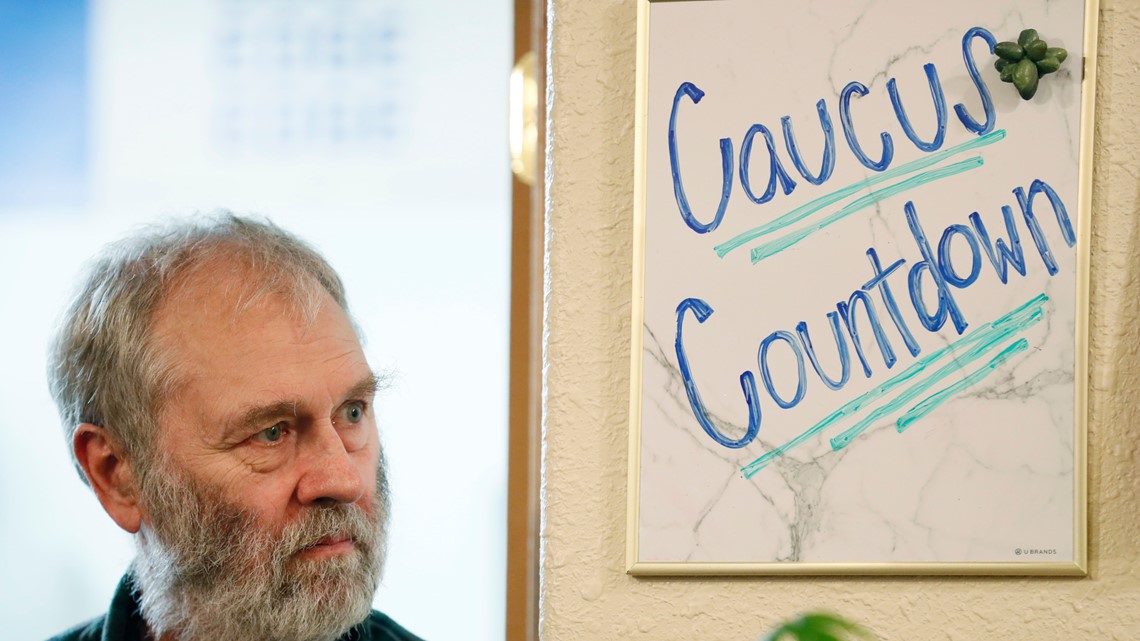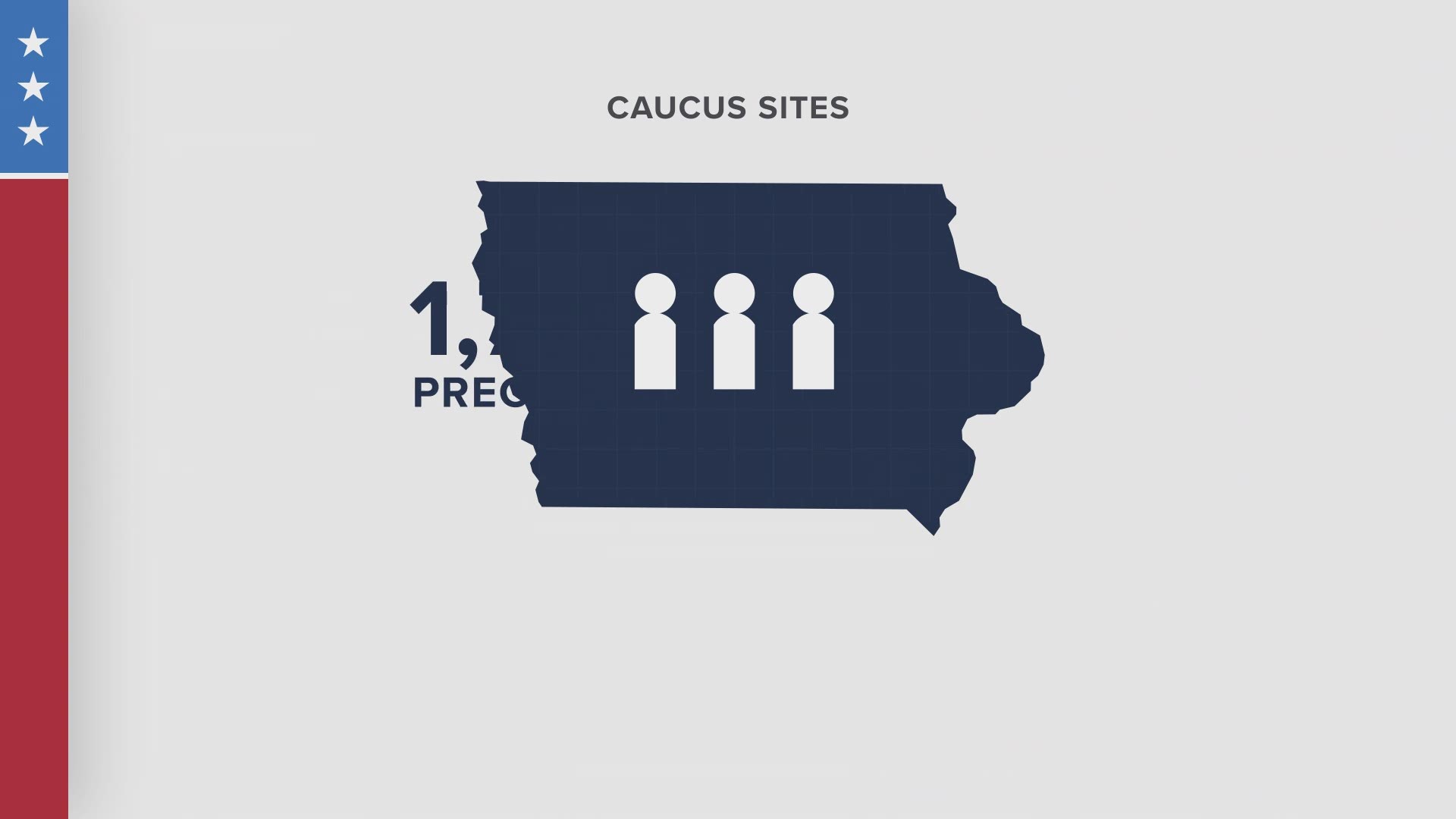WASHINGTON — February 3rd is caucus day in Iowa and it's been a long road to get to this point. Candidates have been on the road trying to drum up support for months already.
And while some have dropped out of the race, several candidates could see their presidential prospects shift based on what happens in Iowa.
With more than 1,700 precincts statewide, along with 28 national and international satellite locations, it's going to be a big day to watch.
So what does the word "caucus" mean anyway?
The belief is that the word derives from the Algonquian native family of languages. The word caucus roughly translates to, "encourage, advise or urge." The word can also mean "give counsel, talk to and incite to action."
According to Merriam-Webster, the definition is "a closed meeting of a group of persons belonging to the same political party or faction usually to select candidates or to decide on policy."
Iowa got its "first-in-the-nation" placement by accident
In 1972, Democrats moved their Iowa caucus earlier on the political calendar than the New Hampshire primary because of scheduling issues and Iowa's long nominating process.
Rules for the selection of delegates complicated things after a hectic 1968 Democratic Convention. Afterward, Democratic national party leaders formed a commission to improve the nomination process so voters would have a direct say as to who would be the nominee, according to History.com.
And because Iowa has a long nominating process, the Democratic Party of Iowa had to change the timing for the caucus that year. It was, apparently, simply a scheduling issue.
Iowans take great pride in being first in the presidential primary cycle and consider this to be a great honor.


The Iowa caucuses are separated out for Democrats and Republicans, and they each do things pretty differently
The process of "caucusing" on both sides takes roughly an hour or so in the evening.
For the Republicans, the process is generally considered to be simpler. Those in the caucus meetings are called activists, and they gather in groups to make their campaign. This is all in preparation for the final pitch. It can be pretty informal at times with candidates' names written on pieces of paper, or some opting for a more formal printed ballot. The votes are counted by chosen representatives and then sent along to Iowa's GOP headquarters where the final numbers are kept.
For the Democrats, it's not that simple.
First of all, there are no secret ballots for the Democrats and those attending Iowa caucus gatherings will be asked to physically move to a section of the room devoted to their candidate.
Some end up in uncommitted groups if they can't make a decision. At this point, groups must have at least 15% of the people that came to that caucus location in their group to remain in the running. This is called being "viable."
If a group isn't considered viable at that point, attendees can either move to a group that is or try to convince others to join them. Once all the low-performing candidates have been weeded out and each group accounts for at least 15% of the room, delegates are awarded. The more support a candidate has during a caucus, the more delegates they are allocated.
The Iowa caucuses are more about gaining momentum in the race than predicting a nominee
Did you know that every president since Jimmy Carter has been in the top three at the Iowa caucuses? Yes, it's true. Well, save for when Tom Harkin of Iowa ran back in 1992. But, this is all to guide you to my point, that the Iowa caucuses are more of a mechanism to sort of speed the race up. It's a way to gain momentum, rather than a solid predictor of who is going to be the nominee for each party, and go on to win the presidency.
The same even holds true within Iowa when it comes to the delegates. Caucusgoers in Iowa elect delegates first to their county conventions. Those folks then go on to elect delegates to state and district conventions. It's interesting because Iowa might be first in the nation when it comes to caucusing, but it's one of the last to select delegates.
Iowa's demographics are rapidly changing, and that could mean changes to caucus rules
On caucus day, Iowans are expected to show up on an early February night in person, in a state that can have some pretty intense winter weather conditions. As The Nation points out, if you can't find a babysitter, if you work nights, if you can't access the site because of a disability or if you don't have transportation, you can't participate.
Former presidential hopeful Julian Castro told NPR, "It's time for the Democratic Party to change the way that we do our presidential nominating process." According to The Nation, Iowa's Asian population has grown by 125% and its Latino population has more than doubled. Iowa's State Data Center says the Latino population in the state has grown by more than 135% since 2000.
The Democratic National Committee has pushed the Iowa Democratic Party to make changes that will be more inclusive of folks who have been excluded historically.
According to the Council of State Governments, in 2016, 91% of caucus goers identified as white. But, Troy Price, the chairman of the Iowa Democratic Party said in the New York Times, “Those who say that diverse voices are not being heard need to spend more time here in Iowa.”
Democratic state senator Claire Celsi told the Times, “If Iowa changed to a primary, we’d be dead.” Sen. Celsi said, “There would be nothing special about it, so I’m against that. I think we should stay a caucus state, as long as we can figure out the inclusion piece — because without that, the caucuses are no good.”
Iowa has tried allowing caucusing by phone, which was stopped after a prototype phone system was hacked by the D.N.C.'s security team. And new satellite caucuses will only count for a fraction of the raw votes that come out of the hundreds of sanctioned caucuses at precincts. There is an awareness of the difficulty that caucusing presents to working Iowans, and 2020 is showing at least some incremental changes in the way things are done.

